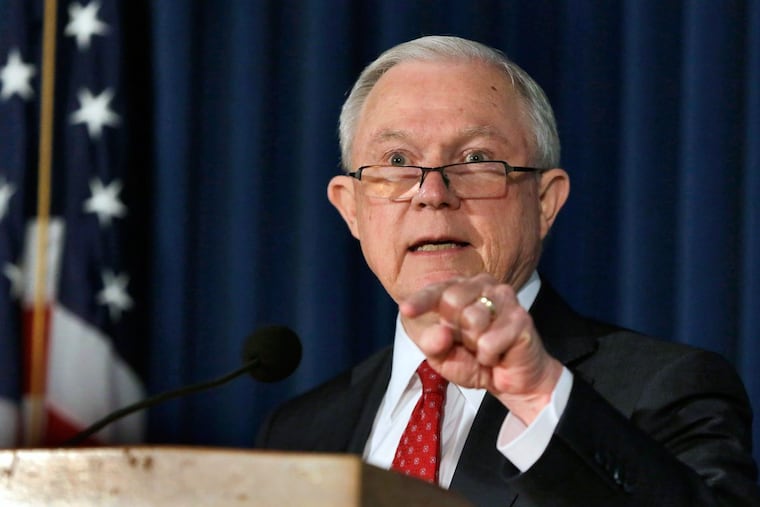Democrats demand that Sessions explain his meeting with Papadopoulos
His participation in a meeting where Papadopoulos raised the prospect of a Trump-Putin meeting came to light this week when Mueller released court documents.

WASHINGTON – Senate Democrats have demanded an explanation from Attorney General Jeff Sessions over why he did not disclose a March 2016 gathering with then-candidate Donald Trump and members of his campaign team at which an adviser offered to set up a meeting between Trump and Russian President Vladimir Putin.
Sessions' participation in the gathering was detailed in court documents released Monday by special counsel Robert Mueller. The adviser who offered to set up the meeting was George Papadopoulos, who has pleaded guilty to lying to the FBI, according to the documents.
Sessions had not previously disclosed the meeting, despite being asked over multiple appearances on Capitol Hill whether he or anyone on the campaign ever discussed meeting with Russians.
"This is another example in an alarming pattern in which you, the nation's top law enforcement officer, apparently failed to tell the truth, under oath, about the Trump team's contacts with agents of Russia," Senate Judiciary Committee member Al Franken (D., Minn.) wrote Thursday in a letter to Sessions.
Senate Republicans have not rushed to Sessions' defense but were less ruffled about his participation in the Papadopoulos meeting.
"If anybody's got any concerns about his meeting, write him a letter and see what he says," Sen. Lindsey Graham (R., S.C.) said.
A Sessions spokeswoman declined to comment this week on the March 31 meeting with Trump and campaign advisers, including Papadopoulos. But on Thursday, a person familiar with Sessions's recollections said that "people who remember the conversation" believed that Papadopoulos was proposing an idea of using his Russian contacts to try to set up a meeting between Trump and Putin, "which was immediately rejected by then-Senator Sessions."
"Papadopoulos was some 29-year old that nobody had ever heard of and who struck people in the room as someone who didn't have a lot of credibility," the person said. "As far as Sessions seemed to be concerned, when he shut down this idea of Papadopoulos engaging with Russia, that was the end of it and he moved the meeting along to other issues."
"The March 31 comments by this Papadopoulos person did not leave a lasting impression," the person said. "The attorney general immediately dismissed it and moved on."
The Washington Post also reported earlier this week that Papadopoulos sat next to Sessions during a dinner at the Capitol Hill Club for campaign advisers weeks before the Republican National Convention.
At the time of that article, a spokeswoman for Sessions declined to comment. But on Thursday, the person familiar with Sessions's recollections said, "the attorney general has no clear recollection of this person. He may have been at future Trump events that Sessions attended – including a dinner at the Capitol Hill Club with some members of the foreign policy committee over the summer – but Sessions doesn't recall any further interactions with him, including any phone calls or emails."
This is not the first time lawmakers have accused Sessions of withholding information from congressional testimony about interactions with or about Russians while working with the Trump campaign.
During his January confirmation hearing to become attorney general, Sessions told the Judiciary Committee that he had had no communication with Russian officials, only to have The Washington Post reveal in March that he had spoken twice with the Russian ambassador to the United States, Sergey Kislyak.
Following the Post report, Sessions recused himself from the Justice Department's Russia probes – an action that infuriated Trump.
Last month, Sessions told the same committee that he was not aware of any Trump surrogates having contacts with Russian officials. Democrats on the committee, including Franken, are now arguing that statement may have been false too.
"He needs to clarify his testimony before our committee," said Judiciary Committee member Sen. Richard Blumenthal, D-Conn. "There were questions that elicited exactly the kind of information that the Papadopoulos plea agreement made."
"The attorney general needs to explain to our committee what are the obvious implications of his presence at that meeting, and how he can square that with his testimony to our committee," said Sen. Christopher Coons (D., Del.), another member of the Judiciary committee.
The person familiar with Sessions's interactions with Papadopoulos said Sessions had been "entirely truthful and consistent on this matter." He "he had no knowledge of any conversations by anyone connected to the Trump campaign with any Russian or any foreign officials concerning any type of interference with any campaign or election in the United States."
Democrats on the Senate Intelligence Committee, which is also looking into allegations of collusion and Russian meddling in the 2016 presidential election, also want a reckoning from Sessions.
"I think there are many more questions for Jeff Sessions," said Sen. Kamala Harris (D., Calif.), a member of the panel. "He should be honest and disclose all truths, especially when he is under oath or testifying before the United States Congress."